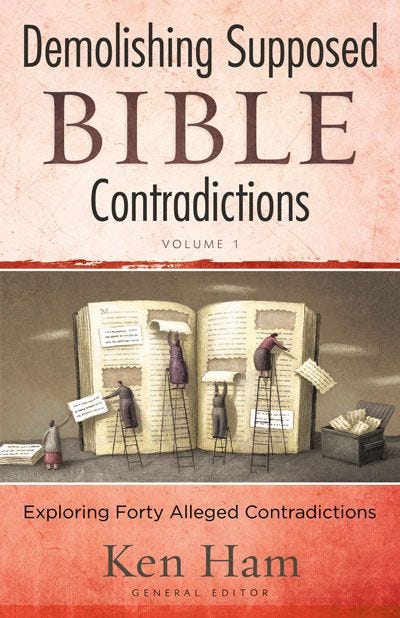Handling Objections to the Bible
The Bible is a book, or rather, a collection of books understood by Christians to be the true Word of the Creator God. NO, THE BIBLE IS NOT FAKE NEWS! (part 2)
1 Timothy 6:20–21
O Timothy, guard the deposit entrusted to you.
Avoid the irreverent babble and contradictions of what is falsely called “knowledge,”
for by professing it some have swerved from the faith.
Grace be with you.
The Bible is an old book. The Bible is a big book. The Bible is a challenging book. Sometimes, even Christians may not always initially “like” what they read in the Bible. Sometimes, they may not fully understand it. Sometimes, they wonder how to logically reconcile two different sections together. Other times, they are in a position where they are “defending” the veracity of the Bible.
This post will touch on those things, but it will be about this: logical fallacies and objections to the Bible. Why? A lot of times when a Christian is hit an objection (or even insult) regarding the reliability of the Bible, the objection itself is logically problematic. I want to show you a beginner’s guide in how to spot these problematic objections.
Colossians 2:4
I say this in order that no one may delude you with plausible arguments.
OBJECTION FAILURE #1: BEGGING THE QUESTION
When you commit the fallacy of begging the question, you are assuming your conclusion without defending it. Begging the question is when one presents a circular argument. A circular argument is one in which the conclusion was included in the premise. Question-begging arguments often only “work” for those who already agree with the argument’s conclusion.
For example, an atheist might say: “The Bible is false because there’s no “god” anyway!” Now, what does this show? Nothing! All the atheist did was assert their belief that no god exists. Then, based upon this foregone conclusion, they assert the Bible can’t be accurate because there is no god to inspire it in the first place. Other atheists may agree, of course. Because they operate with a shared assumption. But this assertion isn’t an argument. An assumption is not an argument; you need an argument.
Another example is someone who does not believe in the supernatural, or that God acts in the world at all, might say: “The Bible can’t be trusted because it contains miracles and those are impossible”. But assuming miracles don’t happen is a different, unproven assumption. If the God of the Bible does exist, according to Scripture, he acts! And this includes supernatural acts, or miracles. This is logical because the God of Scripture created everything, per Genesis 1:1-2:4 and many others. This means miracles would be part of his repertoire. A God who is all-powerful has the power to perform miracles. So, this anti-supernaturalist argument is like saying the Bible is false … because it is false.
Here’s a debate I did on that: Miracles & Resurrection DEBATE / Atheist v Christian
OBJECTION FAILURE #2: PSYCHOLOGICAL OBJECTION
People feel things. People prefer things. Some objections to the Bible amount to the following: “I really don’t feel like God would think that” or “I really just don’t think God is like that” or “I don’t think that God would say or do that”. In a nutshell, this can’t be true because I don’t like it!
In an argument, some people want to bypass logic and go straight to pathos. They skip the facts and appeal to emotion, intuition, or even opinion. Their point may “feel” more resonant to some, but that doesn’t mean that it is. Logic and truth aren’t based upon anyone’s feelings! If an argument is bad, then it’s bad, no matter who agrees with you or who feels the same way. If something is true, it’s true whether anyone believes it or not. However, we care about our feelings so this may alter our opinion on a matter to the point where we’ve deceived ourselves into thinking if we don’t like it strongly enough, well then it must not be true!
For example, when someone says, “the Bible can’t be true because it contains extremely offensive material in it”. Your offense does not entail a valid argument. Or, “this section on ethics just doesn’t feel right”. Your feelings do not determine truth. Now, I realize people don’t usually speak in these exact kind of words and phrases. What I’m after are categories of error. And this category is the kind based more on a psychological and not a truly logical problem. This fallacy is more common than you might imagine, it just comes disguised in all kinds of different ways. But it’s an error because it ignores facts and evokes emotion alone.
IMPORTANT POINT #1: THE GOD OF THE BIBLE IS A GOD OF TRUTH
The Triune God knows all, per Colossians 2:3 and others. For it is he who “in whom are hidden all the treasures of wisdom and knowledge.” He’s always been there and has always known what’s going on, per Isaiah 46:10 and others. He ordains all, that’s why Yahweh can say he declares “the end from the beginning and from ancient times things not yet done, saying, ‘My counsel shall stand, and I will accomplish all my purpose”. Additionally, the God of the Bible cannot lie, per Titus 1:2 and more. That passage speaks of the Christian’s “hope of eternal life”, then says “which God, who never lies, promised before the ages began”.
If the Bible is the Word of God and God can only tell the truth, then there can be no actual error in the Bible. I don’t mean apparent or alleged error, I don’t mean mistakes in the manuscripts, I don’t mean any of that. I mean something false cannot be affirmed in the Scripture. This means that we as Bible-believing Christians should take the challenge of contradictions seriously. It’s not always an easy task but we have book to defend. I’m speaking very frank here.
Psalm 118:8
“It is better to take refuge in the Lord than to trust in man.”
Ultimately, I’m not worried about it, and neither should you be, because the Christian can know that the God of Truth will ultimately be vindicated. We can rest easy knowing that God will not lead us astray. We remember that no other worldview offers truth, hope, satisfaction, and a solid foundation for anything! This is true. Yet, I do not want to brush off challenges. I do not want us to adopt a reckless triumphalism, but rather a sober humility. Thankfully, the Kingdom does not rest on us. Yet we are called to do our part, to be faithful students and to put in the needed work as we love the Lord with all our mind. With that, let’s talk about contradictions and stuff.
IMPORTANT QUESTION: WHAT IS A CONTRADICTION?
A contradiction, logically speaking, is a proposition and its negation. The negation of Proposition A is “Not A”. Both A and Not A cannot be true at the same time and in the same relationship. This is one of the Laws of Logic: the Law of Non-Contradiction. The Law of Contradiction means that you can’t have “A” and “Not A” at the same time and in the same relationship and both be true. It’s a contradiction. One is false, for an actual contradiction cannot be true. For example, the a “square-triangle”, using those words in the standard way, cannot and does not exist. It’s not even a thing; it’s a contradiction. It’s really just two words put together because it is not “real”, nor can it be.
Many alleged Bible contradictions are not contradictions because the two propositions do not conflict. Dr. Jason Lisle gives an example on page 142 in his incredibly helpful book, Understanding Genesis, when he positions a critic asking, "Isn't the fact that Jesus is both God and man a contradiction?"
No. A contradiction would be to say that Jesus is God and not God at the same time and in the same sense. But to say, "Christ is God and man" violates no rules of logic. A person can be both a brother and a friend - there is no contradiction, because there is nothing in the definition of "brother" that excludes an essential aspect of "friend." Likewise, there is nothing in the essential nature of God that precludes Him from taking on the essentials of human nature as well. So the Bible may be counter-intuitive at times, but it is never irrational.
Yes, the Bible teaches that Jesus is both God and man. But no, that is not a contradiction.
POINT #2: WORDS CAN BE USED IN DIFFERENT SENSES & RELATIONSHIPS
Is there such a thing as a “married bachelor”? No, but what if a bachelor is “married to his job”? Well, it’s obvious the word “married” is being used in two different ways, so there is no contradiction here. A similar example happens in Scripture, with the term justification in Paul and James. Again, Dr. Jason Lisle (except this time from the Introduction he wrote in the book Demolishing Contradictions, Volume 1):
Romans 4:2-3 teaches that Abraham was justified by faith alone, not by works. However, James 2:21, 24 teaches that Abraham was justified by works and not by faith alone. Do we have a contradiction here? We do have A and not A at the same time, but the relationship differs. Romans 4 is teaching about justification before God, by faith alone, Abraham was considered righteous before God. But James 2 is teaching about justification before men James 2:18); by works (as a result of faith), Abraham was considered righteous before men. There is no contradiction here.
Another example could be given regarding the doctrine of the Trinity as it relates to the numbers one and three and how they are used – and not used – in formulating and explaining the doctrine. Still, we see that many of the critics, in alleging certain contradictions in Scripture, are actually to be understood as committing the fallacy of equivocation.
What is the equivocation logical fallacy? Equivocation is the logical fallacy of using a word or phrase in an argument in a way to mean two or more things. When committed, the equivocation fallacy can still be appealing to the audience. It relies on misusing a word’s distinct meanings to confuse the hearer. It’s often because the questioner is confused themselves. They are not thinking of the words in a distinct way, as they should, and therefore accidentally commit the fallacy. We just must be aware.
OBJECTION FAILURE #3: FALSE DILEMMA
The False Dilemma Fallacy is when a person argues from an either-or position. The problem is this usually doesn’t considered all relevant possibilities. This is committing the fallacy of false dilemma. Again, Dr. Jason Lisle:
Some alleged contradictions of the Bible are presented as a dilemma: "Was the Bible given by inspiration of God as indicated in 2 Timothy 3:16, or was it written by men as indicated in other passages (Luke 1:3; John 21:24):" The implication is that only one of these can be true, and so, the Bible must contain errors. But this is the fallacy of the false dilemma because there is no reason why the Bible cannot be both inspired by God and also written by men.
So, is the Bible written by man or God? Both, for both can be true. Indeed, they are, as 2 Peter 1:21 bears out: “For no prophecy was ever produced by the will of man, but men spoke from God as they were carried along by the Holy Spirit.”
This mistake can also happen when two words are synonymous and the person doesn’t realize it. For example, the case of Israel also being Jacob – this is the same person, just with two different names.
OBJECTION FAILURE #4: ERRORS OF INTERPRETATION
Other kinds of errors can occur on the interpretation side. For example, taking a text OUT OF CONTEXT is a major problem. Context is key. We have to ask “what’s there” and “what’s NOT there?” Context is KING! As we in the urban apologetics community love to say, “Context Kills False Doctrine”. I still don’t know who coined the term but I know it wasn’t me. But I like it.
Another common problem is when the reader doesn’t take into account the varying genres of the Bible. For example, different literary devices are used in the following:
- HISTORICAL NARRATIVE
- POETIC PASSAGES
- PROPHETIC SECTIONS
There are different rules to properly interpret each genre. For example, we understand thatof the different figures of speech may be present in literature, especially in the poetic sections of the Bible. Another problem can be that of the SWEEPING GENERALIZATION, wherein we apply a general principle as if it were a universal rule. This is especially relevant to the Book of Proverbs.
We also know that the Bible will sometimes use the Language of appearance. Of course, moderns sill engage in this. When you turn on the Weather Channel, you just may hear a meteorologist talking about when the sun rises and sets, even though it technically does neither. This is something we all know and yet we still use phenomenological language, or language of appearance.
IMPORTANT QUESTION #2: IS THE BIBLE “LOST IN TRANSLATION”?
We don’t have much time to talk about this, but I want to say something real quick. I remember reading Greg Gilbert’s book, Why Trust the Bible? Pastor Gilbert wrote about some of the notoriously bad signs featuring English translations in the country of China. He gave some examples:
BAR IS PRESENTLY OPEN BECAUSE IT IS NOT CLOSED
DELICIOUS SPICY GRANDMA (menu item)
LOVABLE BUT PITIFUL GRASS IS UNDER YOUR FOOT
Apparently, many of these silly examples were changed in Shanghai right before the Summer Olympics, to avoid embarrassment. Well, is the Bible like some of those bad signs? Is it … lost in translation? The short answer is NO btw.
Recently, I was in a friendly debate with a few non-Trinitarians. When I asked him about Titus 2:13, he went on auto-pilot, accusing the ESV translators of having a “Trinitarian bias”.
Sometimes, critics try to foist a variety of errors upon the translators. In the case of a purposeful mistranslation like the New World Translation of the Watchtower bible and Tract Society, that may be true. But not usually.
But ultimately, we are very blessed. We can know and trust that this in Greek …
Ἐν ἀρχῇ ἦν ὁ λόγος, καὶ ὁ λόγος ἦν πρὸς τὸν θεόν, καὶ θεὸς ἦν ὁ λόγος.
Sounds like this …
En arche en ho logos kai ho logos en pros ton theon kai theos en ho logos.
And looks like this in English …
“In the beginning was the Word, and the Word was with God, and the Word was God.”
That was John 1:1, using The Greek New Testament, Fourth Revised Edition.
OBJECTION FAILURE #5: ERRORS OF INFERENCE
Other potential problems can be the CONTRADICTION OF INFERENCE, where one infers a contradiction not stated, or the X AND ONLY X FALLACY. By now, you should know that APPARENT FACTUAL CONTRADICTIONS can come from misreading the text or even being confused about the external facts.
With that, I leave you these things to remember:
Remember, WE WON’T GET IT ALL just yet! Isaiah 55:8-9 and Deuteronomy 29:29.
Remember, that DIFFICULT DOESN’T EQUAL FALSE! Sometimes it is a hard saying, as it worse.
Remember, THERE ARE VARIANTS IN THE MANUSCRIPTS. This is a whole other field, called textual criticism.
Remember, we must go ON THE OFFENSE! See, my last post on this.
Lastly, remember to TRUST GOD AND LEVEL UP. STUDYING HELPS and so does prayer!
vocab
phoenix az










